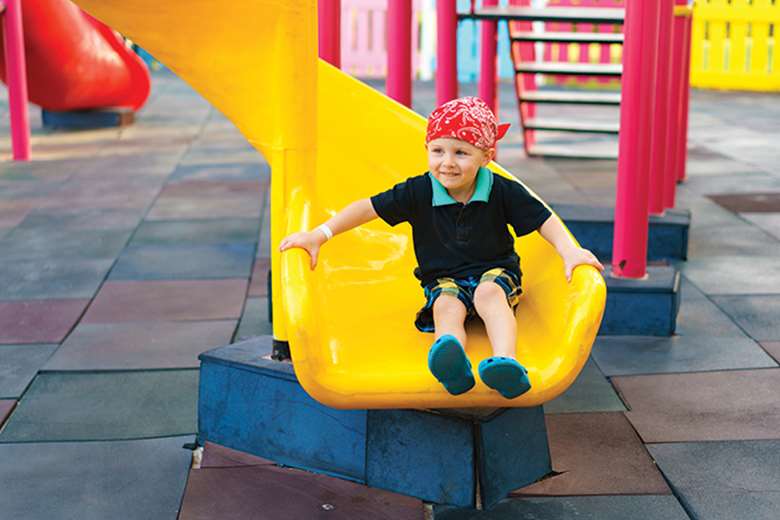An Educational Intervention to Promote Healthy Lifestyles in Preschool Children: A Cluster-RCT
Derren Hayes
Tuesday, May 30, 2017
This study looks at the health benefits that an obesity prevention intervention programme can have for preschool children, and the role play can have as a key form of physical activity for young children.

- Authors: M Iaia, M Pasini, A Burnazzi, E Allara and M Farneti
- International Journal of Obesity, (2017)
Obesity affects a growing number of children in early childhood. Obese preschool children tend to be obese during adolescence and into adulthood. Early childhood is a critical time for preventing an obesity trajectory that is difficult to modify when children start primary school.
A Cochrane review suggests that obesity prevention interventions may achieve the largest effect in the first five years of life. Children learn lifestyles during the first years of life from the adults who care for them. In their families, preschool children mainly develop eating and activity patterns from mimicking their parents' behaviours. Teachers also have a significant role because they provide models that can influence most children who spend many hours a day in childcare centres.
Obesity prevention programme
This study looks at the health benefits that an obesity prevention intervention programme can have for preschool children. It also assesses the role that play can have as this is a key form of physical activity for young children.
The programme was introduced in Cesena, Forlì-Cesena, Italy by local government health agencies.
The prevalence of overweight and obese children was respectively 5.9 and 1.2 per cent among two-year-olds in Cesena. This increased to 11.7 and 5.1 per cent among five-year-olds. This trend highlights that the overweight prevalence doubled and the obesity prevalence increased by five times among older preschool children.
Study method
The educational intervention tried to reach families and childcare centres, and involved a large and representative population of three-year-old children attending a childcare centre for six to eight hours per day. The study set out to promote the following healthy behaviours among three-year-olds: four servings of fruit and vegetables per day, two hours per day of active play, one hour per day of TV-watching, and not consuming fizzy drinks.
In October 2012, a cluster randomised controlled trial was conducted on three-year-old children born in 2009 and attending the first session of public childcare centres (clusters) in Cesena. Each cluster aimed to include at least 15 three-year-old children.
Children's measurements were recorded at baseline and follow-up. Parents kept a diary to record their children's eating habits and activity at home on the last Saturday of October and the first two Saturdays of November, when children were not at childcare centres.
At childcare centres, trained nurses used a stadiometer and a digital scale to record children's height and weight. Height was measured to the nearest 1.0 mm and weight was measured to the nearest 0.1 kg. Body mass index (BMI) was calculated.
Parents' measurements at baseline included self-reported weight and height (used to calculate BMI), level of education and employment status.
The intervention study was carried out from November 2012 to May 2013. To make it sustainable, it took place at local health care centres. Teachers received 10 hours of training to promote more active play at childcare centres and included the subject in their education timetables.
Results
The trial involved 425 three-year-old children at 16 childcare centres. Eight centres were randomly allocated, with 199 children involved in the intervention group and 226 involved in the control group.
A significantly higher percentage of children with a low-risk combined health behaviour score (CHBS) was found in the intervention clusters at one and two-year follow-up: after two years from baseline 48.4 per cent of children in the intervention group had a low-risk CHBS compared with 28 per cent of children in the usual care. Significantly positive results were only seen among those children whose mothers had a medium or high level of education.
After two years from baseline - 18 months after the intervention end - significant and beneficial changes in target behaviours and their CHBS took place among those intervention children whose mothers had a medium or high level of education. However, no significant change in BMI outcomes occurred.
Implications for practice
Clear insights in basic behavioural and biological mechanisms of obesity development during the first years of life are still lacking and most obesity prevention programmes have been focusing on school children. The study found that promoting active play improved preschool children's CHBS in the long term, but it achieved no significant improvement in BMI outcomes.
Future investigation should use reliable indicators for preschool children's physical activity and fruit and vegetable intake to minimize any risk of bias, such as parents self-reporting their children's behaviours, and to appropriately assess relationships between parents'/childcare teachers' specific activities and subjects and children's behaviour changes.
FURTHER READING
An Evaluation of Meriden Adventure Playground: Focus on Impact on Physical Activity and Healthy Eating, Nikita Price, Alison Trout, Journal of Playwork Practice, May 2017
Practice-based Research in Children's Play, edited by Wendy Russell, Stuart Lester, Hilary Smith, Policy Press, April 2017
Are Secondary School Environments Conducive for Active Play Opportunities? Brendon Hyndman, Barbara Chancellor, International Journal of Play, February 2017




